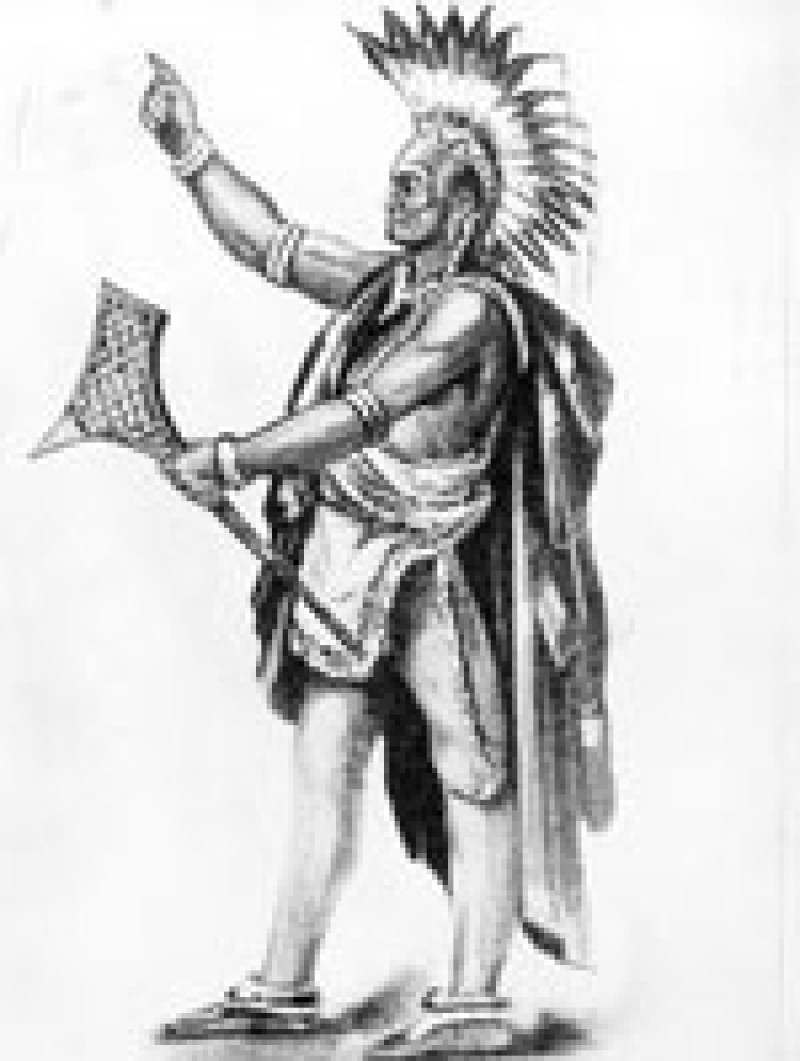Pontiac (c. 1714 - April 20, 1769)
Pontiac, Ottawa war leader, probably was born at the Ottawa village on the Detroit River about 1714. His life before 1763 is obscure. He was a war leader of the Ottawa as early as 1747 and a strong supporter of New France, both then, when the Huron Nicholas Orontony agitated against the French, and during the Seven Years War.
Pontiac's reputation rests upon his part in the Indian war of 1763, but historians have disagreed about his significance. Francis Parkman's picture of Pontiac as the controlling genius of the revolt has been justly criticized, but attempts to reduce him to the status of a local villain whose influence beyond Detroit was at best of no great significance underestimate his importance. He was neither the originator nor the strategist of the rebellion, but he kindled it by daring to act, and his early successes, ambition and determination won him a temporary prominence not enjoyed by any of the other American Indian leaders.
The uprising was rooted in the discontent among American Indians adjusting to a Britain emerging victorious from the Seven Years War. This and other grievances, including the British monarchy's attempts to confine trade to army posts and prohibit the liquor traffic, left the American Indians feeling threatened, debased and inconvenienced and fed a rising militancy that eventually enabled war leaders to overcome the voices for peace.
As early as 1761 Senecas of the Ohio and Genesee began inciting a concerted attack upon Britain's western garrisons. By the spring, Pontiac had forged a local alliance of Ottawas, Potawatomies and part of the Wyandots, giving him more than 400 warriors. He sent war belts to the Mississaugi-Ojibwas of the Thames (Ontario), the Ojibwas of Saginaw and the Ottawas of L'Arbre Croche, but without waiting for replies he decided to strike at Fort Detroit, then held by less than 150 British under Major Henry Gladwin. In a council on the Ecorse River on April 27, 1763, Pontiac used a message from the Delaware Indian prophet Neolin, who attributed the misfortunes of the American Indians to their corruption by the whites, to throw divine authority behind his plan to surprise the fort. The attack itself failed on May 7.
Frustrated, Pontiac incited violence elsewhere, and his warriors participated in local uprisings that took Forts Sandusky (Ohio), St. Joseph (Mich.), Miamis and Ouiatenon (Ind.), and Presque'Isle (Pa.) between May 16 and June 22. As news of Pontiac's attacks spread, American Indians from Lake Michigan to the Ohio and the Genesee rose against the British. Within two months, nine of Britain's 11 western posts had been taken, Detroit and Fort Pitt were under siege, and American Indians were raiding the Pennsylvania and Virginia frontiers.
But Pontiac's support at Detroit, after increasing to almost 1,000 warriors, soon crumbled. The futile siege, shortages of ammunition, the approach of the fall hunting season and confirmation from the French post Fort de Chartres on the Mississippi that France had been defeated and Canada ceded to Britain all eroded American Indian resolve. At the end of October, with much of his influence dissipated, Pontiac raised the siege and withdrew with a diminished following to the Maumee River.
Both Pontiac's influence and hostility were short-lived. In 1765 he realized that the Ohio Indians had sued for peace the previous October and November and that French power was in eclipse. In July he negotiated with the British agent George Croghan (c. 1720 - 1782), accompanying him to Detroit for preliminary peace talks the following month. In July 1766 he formally concluded hostilities in council with Sir William Johnson at Oswego, New York. The American Indians escaped punishment, but their war alerted the British monarchy to the need for an improved frontier policy, justifying the boundary established by the Royal Proclamation of 1763, the regulations drawn up by the Board of Trade and Plantations in 1764, and the attempt to maintain a substantial military presence in America. Pontiac, whose name was linked to the American Indian struggle, became one of its victims.
In truth he was a rather pathetic figure, clinging to the shadow of former glories but almost devoid of political influence. Pontiac had several wives. His last, Kan-tuck-ee-gun (the Woman Canoe Paddler), the sister of a former wife, was remembered as ?an excellent woman? and signed a treaty in 1817.

